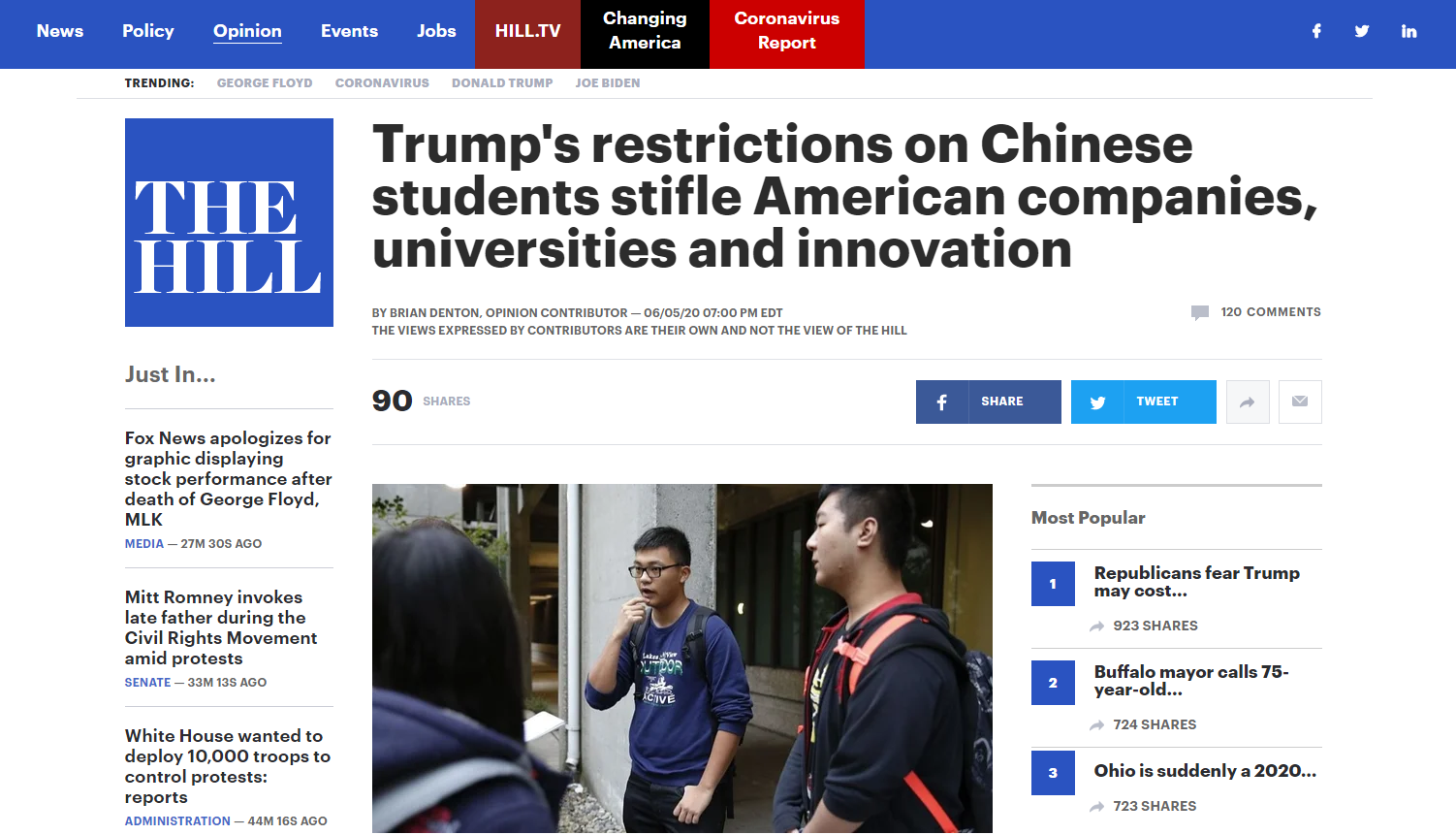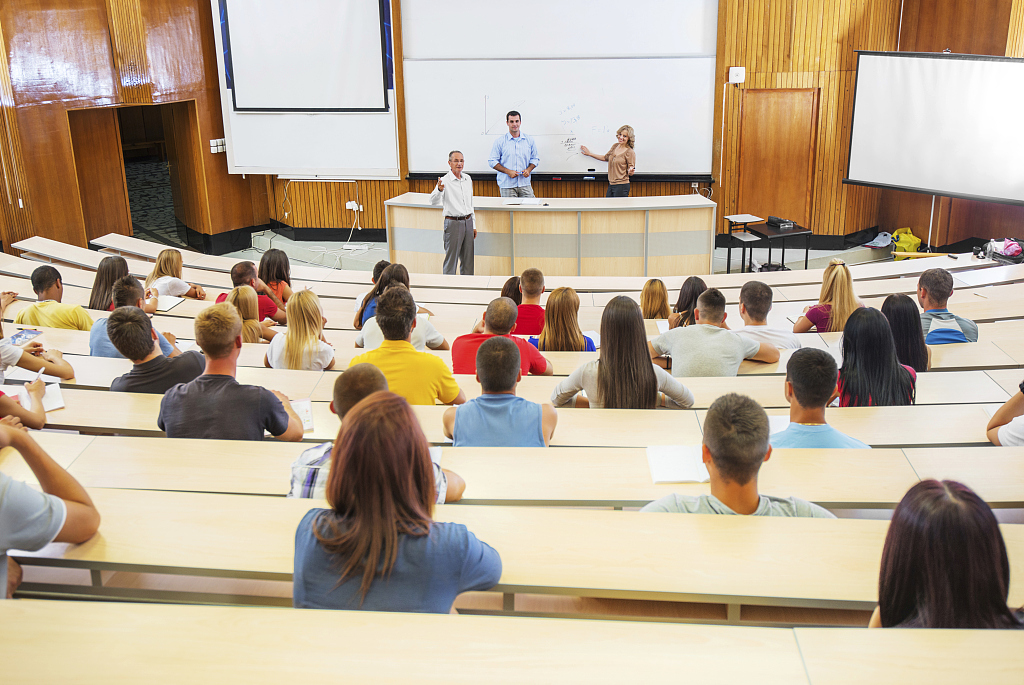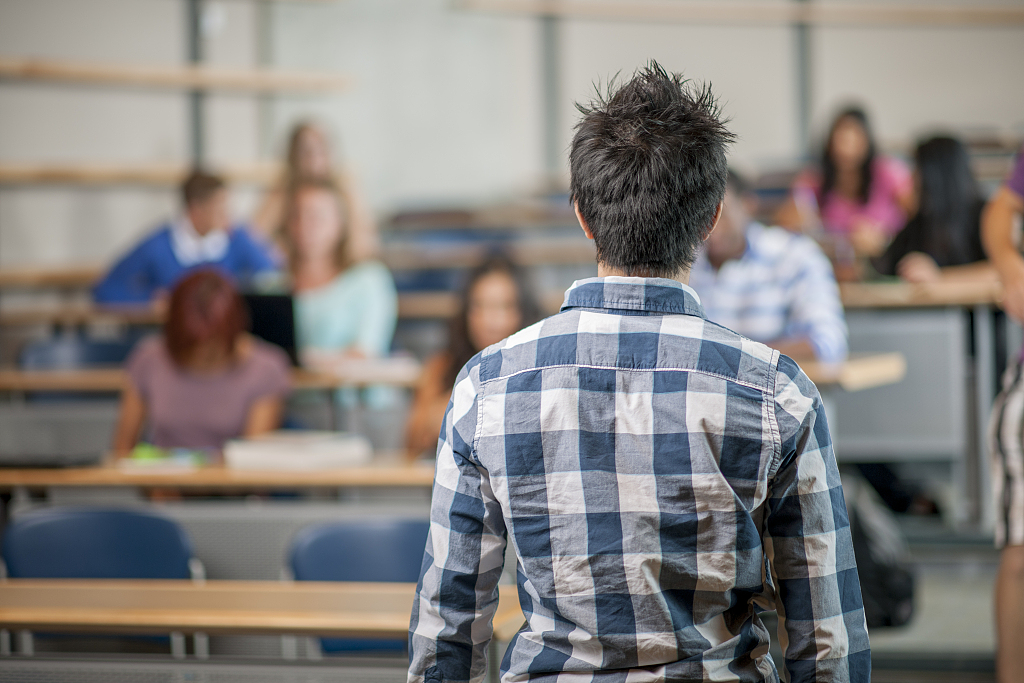
U.S. President Donald Trump's immigration order to restrict Chinese students and scholars would "stifle American companies, universities and innovation," Brian Denton, a professor and the chair of the Department of Industrial and Operations Engineering at the University of Michigan, has warned.
American news website The Hill – a Washington DC-based outlet focusing on politics, policy, business and international relations – published an opinion piece penned by Denton on Friday.
Denton first pointed out that the new restrictions for Chinese students and scholars "threatens to cut off American universities from the valuable contributions that Chinese students make to our scholarly pursuits, and to jeopardize the $13 billion that they contribute to the United States economy each year."
"By suspending entry of certain students and researchers from the People's Republic of China, the White House is also stifling a flow of STEM talent that is critical to the success of American universities, as well as to companies like Amazon, Apple, Ford and IBM," the professor added.

American news website The Hill published an opinion piece on June 5 penned by Brian Denton, a professor and the chair of the Department of Industrial and Operations Engineering at the University of Michigan. /CGTN screenshot of The Hill
American news website The Hill published an opinion piece on June 5 penned by Brian Denton, a professor and the chair of the Department of Industrial and Operations Engineering at the University of Michigan. /CGTN screenshot of The Hill
Noting that "much remains to be understood about how this will affect the more than 350,000 Chinese students enrolled in American universities," he stressed the order has the potential to cause severe consequences for institutes of higher education and the economic security of the U.S., specifically pertaining to the "F" and "J" type visas that allow people to visit the country for the purposes of learning and conducting scientific research.
Citing his own experience of teaching and working alongside students from all over the world, including many from China, in the field of industrial engineering, Denton spoke highly of the young talents' academic performances and contributions that "positively impact fields like business, energy, mobility and health care."

Denton stresses that the bans have the potential to cause severe consequences for institutes of higher education and the economic security of the U.S. /VCG
Denton stresses that the bans have the potential to cause severe consequences for institutes of higher education and the economic security of the U.S. /VCG
He said that in addition to research advances and teaching assistance, many of these students also contribute to the financial viability of higher education in the nation, noting that "their tuition payments provide a valuable revenue stream that helps universities like ours deliver on our research and educational missions, in pursuit of the public good."
"I work together with many of these highly successful people myself. They are now my colleagues as they have chosen to build their careers and lives in the United States," wrote the professor.
"The diversity of perspectives they offer enhances organizations, making them more productive and successful."
Hurting America more than China
On May 29, Trump signed a presidential proclamation that suspends the entry of graduate students and researchers from China. It went into effect on June 1.

Some critics indicate that it is more likely to harm efforts in America to innovate and produce important research. /VCG
Some critics indicate that it is more likely to harm efforts in America to innovate and produce important research. /VCG
The sweeping proclamation has come under criticism as many reckoned that it would economically hurt U.S. universities, with some critics indicating that it is more likely to harm efforts in America to innovate and produce important research.
"The proclamation will damage the exchange of knowledge and talent," said Jeffrey Gorsky, former chief of the Legal Advisory Opinion section of the Visa Office in the U.S. Department of State, in an interview with Forbes on June 1.
"America will lose out on a valuable talent pool and the financial and scientific contributions these students make to U.S. universities and the United States," Gorsky added.
Fueling anti-Asian sentiment
There are also concerns that the Trump administration's decisions and the president's rhetoric about Chinese students will create discrimination against the Chinese community in the United States, which has seen an increase of anti-Asian sentiment during the novel coronavirus pandemic.

Many are concerned that the Trump administration's decisions and the president's rhetoric about Chinese students will create discrimination against the Chinese community in the U.S. /VCG
Many are concerned that the Trump administration's decisions and the president's rhetoric about Chinese students will create discrimination against the Chinese community in the U.S. /VCG
"There is a disturbing pattern emerging between the racist and xenophobic rhetoric used by Trump regarding COVID-19 and the new efforts to impose limits on Chinese students," said a statement from Stop AAPI Hate, a coalition consisting of Chinese for Affirmative Action, the Asian Pacific Policy and Planning Council and Asian American Studies at San Francisco State.
Asian Americans Advancing Justice also lashed out at Trump's actions in a joint statement with affiliates in Washington DC, Los Angeles, San Francisco, Atlanta and Chicago, saying: "This ban on Chinese students from studying in the U.S. is another way to scapegoat our communities, just as he has with the Muslim, African, refugee, and immigration bans."
"The racial profiling of Chinese Americans and immigrants related to claims of espionage will lead to more irreparable harm against innocent Chinese Americans," read the joint statement.
(Cover image via VCG)